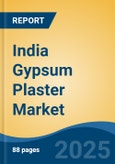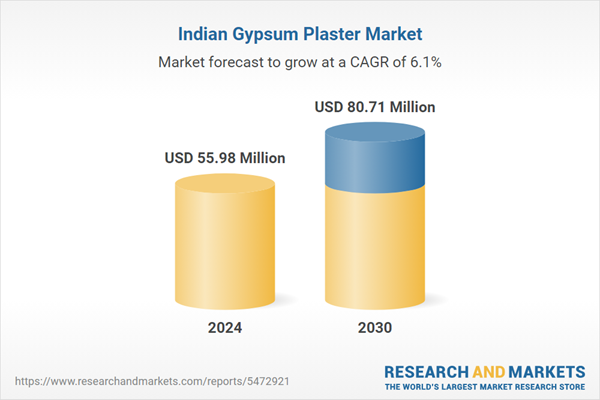Speak directly to the analyst to clarify any post sales queries you may have.
10% Free customizationThis report comes with 10% free customization, enabling you to add data that meets your specific business needs.
Gypsum plaster is a construction material derived from gypsum, a naturally occurring mineral primarily composed of calcium sulfate dihydrate (CaSO₄·2H₂O). It is widely used in the building industry to coat walls, ceilings, and other surfaces, providing a smooth and durable finish. The manufacturing process involves heating gypsum to remove its water content through calcination, which produces a fine powder. This powder is then mixed with water to create a paste that can be applied to various surfaces.
Gypsum plaster offers numerous benefits, including fire resistance, sound insulation, and ease of application. It is non-toxic and free from harmful gas emissions, making it an environmentally friendly option for interior finishes. Its ability to be molded and shaped allows for intricate designs and textures, enhancing aesthetic appeal. This material is commonly used in residential, commercial, and industrial construction due to its versatility and ability to provide seamless, smooth finishes. Additionally, gypsum plaster's moisture-absorbing properties help regulate indoor humidity levels, making it an ideal choice for creating comfortable and visually appealing interiors.
Key Market Drivers
Government Initiatives and Regulatory Support
The Indian government’s initiatives to promote the construction and real estate sectors have been instrumental in driving the growth of the gypsum plaster market. Several policy measures and incentives have been introduced to encourage residential and commercial construction, thus directly influencing the demand for materials like gypsum plaster. The government's focus on infrastructure development, affordable housing, and sustainable building practices is creating a favorable environment for the adoption of gypsum plaster in India.A notable initiative is the "Housing for All" program, which aims to provide affordable housing to millions by 2022. This has resulted in a surge in residential construction, particularly in tier 2 and tier 3 cities, where builders are increasingly using gypsum plaster due to its cost-effectiveness, quick application, and superior finish. Additionally, the government's push for the development of smart cities and modern infrastructure projects presents new opportunities for gypsum plaster in urban centers. Gypsum plaster, known for its fire resistance, durability, and lightweight nature, aligns well with the vision of creating safer and more sustainable cities.
Regulatory frameworks that promote energy-efficient and environmentally friendly building practices further support the market. The Bureau of Energy Efficiency (BEE) has set standards for building energy performance, and gypsum plaster is recognized for its ability to enhance thermal insulation, reduce heat gain, and improve energy efficiency. These regulations are encouraging the growth of the gypsum plaster market as builders and developers comply with energy-efficiency requirements.
Key Market Challenges
Supply Chain and Raw Material Issues
A key challenge facing the India Gypsum Plaster market is the supply chain and procurement of raw materials. Although gypsum is abundant in certain regions, its extraction and processing pose significant logistical challenges. The availability and quality of gypsum can vary across India, leading to inconsistencies in supply for plaster manufacturers.India’s gypsum reserves are mainly located in states such as Rajasthan, Gujarat, and Jammu & Kashmir. However, transporting gypsum to manufacturing plants located farther from these reserves can be costly and time-consuming. Furthermore, fluctuations in gypsum availability due to mining restrictions, environmental concerns, or regulatory policies can disrupt production. The bulky nature of gypsum adds to transportation costs, impacting the cost-effectiveness of the final product. These challenges are exacerbated by the increasing demand for gypsum plaster due to the ongoing construction boom.
Additionally, gypsum prices are subject to volatility due to global demand, mining regulations, and environmental factors. Such price fluctuations create uncertainty for manufacturers, who must frequently adjust their pricing for gypsum plaster, leading to market instability. The supply chain for other essential materials used in gypsum plaster production, such as additives, binders, and chemicals, faces similar challenges. The import of these materials adds to costs, and disruptions in global trade can further delay production. Recent global supply chain disruptions, intensified by events like the COVID-19 pandemic, have made it even harder for Indian manufacturers to maintain smooth operations.
Manufacturers are exploring alternative sources of gypsum, such as imports and synthetic gypsum, but these solutions also present logistical, environmental, and cost challenges. Addressing these supply chain issues is crucial for the long-term sustainability and profitability of the India Gypsum Plaster market.
Key Market Trends
Increasing Adoption of Ready-Mix Gypsum Plaster
A significant trend in the India Gypsum Plaster market is the growing preference for ready-mix gypsum plaster. These pre-mixed products offer convenience by eliminating the need for on-site mixing, saving time and labor. This trend is particularly prominent in urban areas where rapid construction is crucial.Ready-mix gypsum plaster offers several advantages over traditional plaster. It ensures consistent quality, as the plaster is mixed under controlled conditions with precise ratios of gypsum, additives, and other materials. This consistency reduces application errors and ensures a smoother, more professional finish. Furthermore, the convenience of ready-mix products speeds up construction timelines, leading to greater overall productivity. These products are also easier to store and have a longer shelf life, making them a convenient choice for construction sites that may not be ready for plaster application immediately.
As urbanization continues and construction projects grow, the demand for efficient, high-quality building materials is rising. Ready-mix gypsum plaster, with its time-saving and cost-effective benefits, is gaining popularity, especially in large-scale residential, commercial, and infrastructure projects. It accounts for an estimated 35-40% of total gypsum plaster consumption in India.
Key Market Players
- Sakarni Plaster (India) Private Limited
- Saint-Gobain Gyproc India Ltd.
- J.K. Lakshmi Cement Ltd.
- Walplast Products Pvt. Ltd.
- DCM Shriram Ltd. (Shriram Cement Works)
- Kaya Maya Industries (Trimurti Wall Care Products Pvt Ltd)
- TMC Gypsum India Ltd
- USG Boral
Report Scope
This report segments the India Gypsum Plaster Market by application, packaging size, end-user, and region, with additional insights into industry trends.Market Segmentation:
By Application:
Red Bricks, Concrete Blocks, RCC Surface, Sand CementBy Packaging Size:
Less than 10 Kg, 10-20 Kg, 20-25 Kg, Above 25 KgBy End User:
Residential, Commercial, InfrastructureBy Region:
South India, North India, West India, East IndiaCompetitive Landscape
The report includes detailed profiles of major companies in the India Gypsum Plaster Market.Available Customizations:
TechSci Research offers customizations of the India Gypsum Plaster Market report, including detailed analysis and profiling of additional market players (up to five) according to specific company needs.:Company Information:
In-depth analysis and profiling of additional market players (up to five).This product will be delivered within 1-3 business days.
Table of Contents
Companies Mentioned
- Sakarni Plaster (India) Private Limited
- Saint-Gobain Gyproc India Ltd.
- J.K. Lakshmi Cement Ltd.
- Walplast Products Pvt. Ltd.
- DCM Shriram Ltd. (Shriram Cement Works)
- Kaya Maya Industries (Trimurti Wall Care Products Pvt Ltd)
- TMC Gypsum India Ltd
- USG Boral
Table Information
| Report Attribute | Details |
|---|---|
| No. of Pages | 88 |
| Published | February 2025 |
| Forecast Period | 2024 - 2030 |
| Estimated Market Value ( USD | $ 55.98 Million |
| Forecasted Market Value ( USD | $ 80.71 Million |
| Compound Annual Growth Rate | 6.1% |
| Regions Covered | India |
| No. of Companies Mentioned | 8 |









